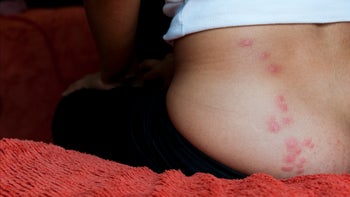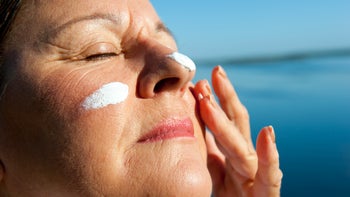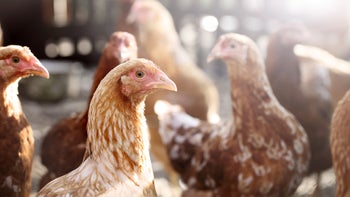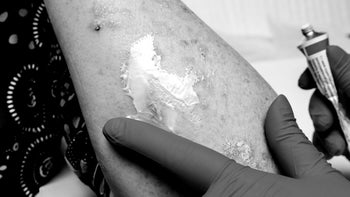
Why Do Mosquitoes Bite Me So Much? 7 Reasons You’re a Mosquito Magnet
Key takeaways:
Some people attract mosquitoes because of things they can’t change — like their blood type or how much heat they give off.
Your diet doesn’t affect how likely you are to get bitten by mosquitoes.
There are ways you can make yourself less appealing to mosquitoes, like wearing light-colored clothing and using insect repellent.
Table of contents
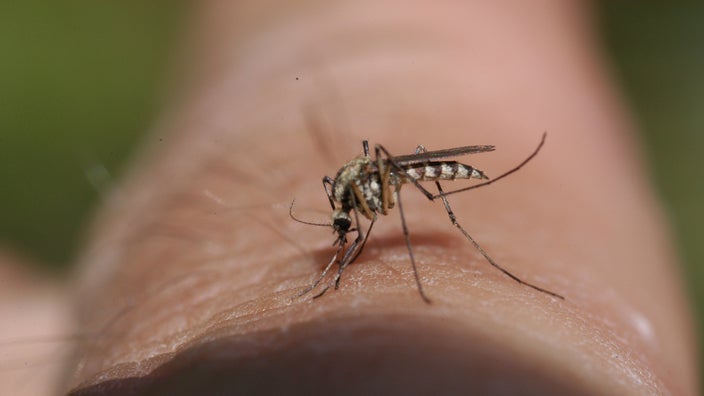
Do you know someone who always seems to get bitten by mosquitoes? Research shows that some people really are “mosquito magnets.”
No one wants to attract a mosquito’s attention. Mosquito bites aren’t just irritating — they can get infected and cause more serious symptoms. And mosquitoes can spread illnesses, like West Nile virus, dengue fever, or malaria to humans through bites.
Here are seven reasons you might be attracting mosquitoes — and what you can do about it.
Search and compare options
1. Carbon dioxide
It may sound scary — but you’re attracting mosquitoes just by breathing. With every exhale, you give off carbon dioxide (CO2). And mosquitoes know that where there’s CO2 there are people to bite. In fact, sensing CO2 seems to be the first thing to alert mosquitoes that a meal is close by. Next they use senses like smell, vision, and heat-sensing to find humans.
2. Body odor
Mosquitoes can “smell” you. When you sweat, your body gives off chemicals, including carboxylic acid, ammonia, and lactic acid. Each person releases a different amount of these chemicals. And some people give off just the right amount of each one — creating an irresistible perfume that attracts mosquitoes.
There’s also growing evidence that the skin’s microbiome adds to the appealing smell some people give off.
There’s nothing you can do to change how much of these chemicals you give off when you sweat. Things like deodorant won’t change your body’s natural metabolism. And right now, there’s no evidence that you can change your skin’s microbiome to deter mosquitoes.
3. Body temperature
Mosquitoes are “heat-seeking,” which means they are drawn to body heat. Experts have found that mosquitoes can detect even small differences in temperature. If you have a higher body temperature (like during exercise), you may find yourself the target of nearby mosquitoes.
4. Blood type
People with certain blood types are more likely to get bitten by mosquitos. There’s research showing that people with Type O blood are more likely to get bites from Aedes aegypti mosquitoes (a common mosquito in the U.S.). On the other hand, people with Type A blood tend to be less desirable targets for these pests.
Need relief from mosquito bites? Here’s our roundup of the best treatments for mosquito bites.
Best natural mosquito repellents: Looking for natural mosquito repellent but not sure which to choose? Take a look at our list of natural repellents that actually work.
Is DEET safe? It is. Here’s our summary of the latest research on DEET safety.
5. Diet
For years, researchers have been trying to figure out if a person’s diet can make them more likely to attract mosquitoes. It turns out your diet doesn’t really affect your chances of getting mosquito bites. But there are possible exceptions — beer and bananas.
A small study showed that drinking beer makes you more likely to attract mosquitoes. Another small study suggests that eating bananas makes you more attractive to mosquitoes. But these studies weren’t strong enough for researchers to say you should stop drinking beer and eating bananas to decrease your risk of getting bitten. So don’t throw out that banana just yet.
6. Clothing color
Mosquitoes may also be influenced by the colors you wear. A recent study showed that orange and red colors attract mosquitoes. This same study showed that mosquitoes weren’t quite as interested in green and blue colors. There’s also evidence that mosquitoes are more attracted to people when they wear darker colors.
Read more like this
Explore these related articles, suggested for readers like you.
There’s no color that can make you “invisible” to mosquitoes. But lighter colors, especially light blue and green, seem to attract less attention from mosquitoes.
7. Pregnancy
Studies show that you’re much more likely to attract mosquitoes when you’re pregnant. Pregnancy increases your metabolism. Increased metabolism means you’re giving off more carbon dioxide and heat — two mosquito magnets.
How to prevent mosquito bites
Like humans, mosquitoes want to work smarter, not harder. They’ll get their meal from the easiest possible source. So while you can’t control your blood type or the chemical makeup of your sweat, you can make yourself more difficult to bite. Here are a few tips.
1. Eliminate standing water around your home
Mosquitoes lay their eggs in standing water. You can help control the mosquito population near you by getting rid of places for water to accumulate. This can reduce the number of adult mosquitoes in an area by as much as 70%.
2. Cover your skin
Wear long sleeves and pants whenever possible. The less skin you expose, the harder it is for mosquitoes to bite you. You can get a mosquito bite through clothing, but you’re less likely to get bitten if you’re wearing clothes.
3. Choose the right time of day to be outside
Mosquitoes are more active during certain times of the day — the hours right before sunset and early morning before the sun has fully risen. So if you’re going for a run or working outdoors, try not to do it during peak feeding times.
4. Wear light-colored clothing
Mosquitoes are attracted to darker colors. Swap out dark outfits for lighter colors to help avoid detection.
5. Use mosquito repellent
Mosquito repellent makes you less appealing to mosquitoes. The most effective insect repellents have DEET. You want to apply DEET to both exposed skin and clothes. Bracelets or wristbands (even those containing DEET) don’t keep mosquitoes away. If you prefer not to use DEET-based repellent, you can try one of these natural options approved by Environmental Protection Agency (EPA):
Picaridin
Oil of lemon eucalyptus
Para-menthane-diol (PMD)
6. Decorate with plants that repel mosquitoes
Some studies have shown that essential oils derived from citronella, basil, and marigold can repel mosquitoes. But there’s not much evidence that adding these plants to your garden will drive away mosquitoes.
Frequently asked questions
Adult female mosquitoes bite because they need blood to make eggs. But their primary food source is actually flower nectar.
Redness and bumps from mosquito bites generally last a few days. But the itching may last up to 7-10 days.
You can help get rid of the itch from a mosquito bite with home remedies like using a cold compress or applying a paste made from baking soda and water. Over-the-counter antihistamines and hydrocortisone can also help.
The bottom line
Some people are mosquito magnets — they’re more likely to get bitten by mosquitoes. Some things that make you more attractive to mosquitoes include your blood type, body temperature, and how much ammonia you give off in your sweat. There’s nothing you can do to change these things, but you can still take steps to make yourself less attractive to mosquitoes. You can prevent mosquito bites by keeping your skin covered, wearing light-colored clothing, and using an EPA-approved mosquito repellent, like DEET.
Why trust our experts?


References
Acree, F., Jr., et al. (1968). L-Lactic acid: A mosquito attractant isolated from humans. Science.
Ali, A., et al. (2016). Chemical composition and biting deterrent activity of essential oil of Tagetes patula (marigold) against Aedes aegypti. Natural Product Communications.
American Academy of Allergy Asthma and Immunology. (2024). Take the bite out of mosquito stings.
Ansell, J., et al. (2002). Short-range attractiveness of pregnant women to Anopheles gambiae mosquitoes. Transactions of The Royal Society of Tropical Medicine and Hygiene.
Centers for Disease Control and Prevention. (2016). Mosquito-borne diseases.
Centers for Disease Control and Prevention. (2023). Mosquitoes, ticks and other arthropods.
Centers for Disease Control and Prevention. (2024). About mosquitoes in the United States.
Cumberland County. (n.d.). Mosquito facts - 29 things you didn't know about mosquitoes.
Fradin, M. S., et al. (2002). Comparative efficacy of insect repellents against mosquito bites. The New England Journal of Medicine.
Greppi, C., et al. (2021). Mosquito heat-seeking is driven by an ancestral cooling receptor. Science.
Havlicek, J., et al. (2006). The effect of meat consumption on body odor attractiveness. Chemical Senses.
Lefèvre, T., et al. (2010). Beer consumption increases human attractiveness to malaria mosquitoes. Public Library of Science One.
McMenamin, C. J., et al. (2014). Multimodal integration of carbon dioxide and other sensory cues drives mosquito attraction to humans. Cell.
Mizejewski, D. (2022). What purpose do mosquitoes serve? National Wildlife Federation.
Nararak, J., et al. (2016). Avoidance behavior to essential oils by Anopheles minimus, a malaria vector in Thailand. Journal of the American Mosquito Control Association.
National Institutes of Health. (2022). Skin compounds associated with attractiveness to mosquitoes. U.S. Department of Health and Human Services.
Paskewitz, S., et al. (2018). Impact of consumption of bananas on attraction of Anopheles stephensi to humans. Insects.
Population Reference Bureau. (n.d.). Remove standing water.
Prasadini, M., et al. (2019). Blood feeding preference of female Aedes aegypti mosquitoes for human blood group types and its impact on their fecundity: Implications for vector control. American Journal of Entomology.
Public Health Department of San Luis Obispo. (n.d.). What you need to know: Mosquitoes love standing water.
Rockefeller University. (2015). Mosquitoes are tuned to seek out temperatures that match warm-blooded hosts.
Qiu, Y. T., et al. (2006). Interindividual variation in the attractiveness of human odours to the malaria mosquito Anopheles gambiae. Medical and Veterinary Entomology.
San Alberto, D. A., et al. (2022). The olfactory gating of visual preferences to human skin and visible spectra in mosquitoes. Nature Communications.
Shirai, Y., et al. (2004). Landing preference of Aedes albopictus (Diptera: Culicidae) on human skin among ABO blood groups, secretors or nonsecretors, and ABH antigens. Journal of Medical Entomology.
Van Breugel, F., et al. (2015). Mosquitoes use vision to associate odor plumes with thermal targets. Current Biology.
Velhurst, N. O., et al. (2011). Composition of human skin microbiota affects attractiveness to malaria mosquitoes. Public Library of Science One.






